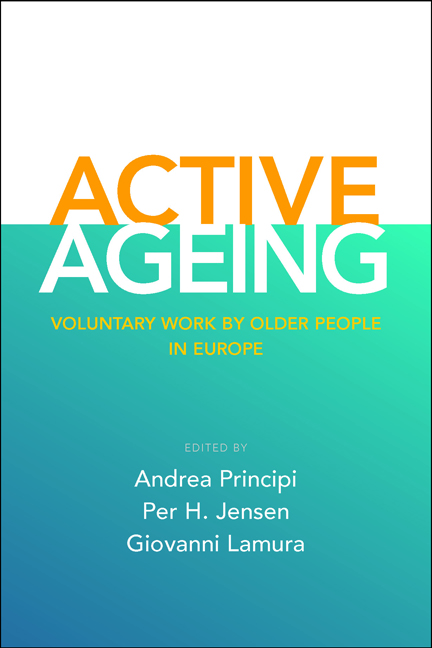Book contents
- Frontmatter
- Contents
- List of tables and figures
- Notes on the contributors
- Acknowledgements
- Foreword
- Part I Realising volunteering by older people in Europe An overarching approach
- Part II Opportunities and restrictions for older volunteers National experiences
- Part III Opportunities and restrictions for older volunteers Case studies in European voluntary organisations
- Part IV Conclusions
- Index
five - Older volunteers in Germany: opportunities and restrictions in the welfare mix
Published online by Cambridge University Press: 05 March 2022
- Frontmatter
- Contents
- List of tables and figures
- Notes on the contributors
- Acknowledgements
- Foreword
- Part I Realising volunteering by older people in Europe An overarching approach
- Part II Opportunities and restrictions for older volunteers National experiences
- Part III Opportunities and restrictions for older volunteers Case studies in European voluntary organisations
- Part IV Conclusions
- Index
Summary
Introduction
Voluntary work in Germany is firmly rooted in a strong civil society, and particularly involved in the provision of social services through churches and large welfare organisations. However, volunteering in Germany is not only limited to the social sector – which includes elder care activities and care for people with disabilities (Gensicke, 2005a) – but is also strong in such fields as sport, culture and politics. Although no data is available on voluntary organisations as such and on the sector's contribution to GDP (gross domestic product), the number of volunteers (which is known) has increased substantially in recent decades, reaching nowadays about one third of the German population.
For a long time, voluntary work in Germany was related to the tradition of the male breadwinner model of the family and thus, the structures of volunteering were strongly gendered: men were usually active in voluntary work as well as having full-time employment, often in leadership roles that could also contribute to improving their professional reputation, whereas women were much more often not employed housewives performing voluntary activities in charity work and social services (Pfau-Effinger and Magdalenic, 2009). Since the 1990s, however, a shift has taken place towards a male breadwinner/female part-time career model, in which the participation of women in gainful employment has become more important (Pfau-Effinger and Magalenic, 2009). Overall, the engagement level of men as volunteers is still slightly higher than that of women.
As mentioned before, civil society and volunteering play a big role in the provision of welfare beside the state and the market. Without the participation of volunteers, welfare institutions and organisations would be overburdened, so volunteers involvement is usually appreciated and taken into account (Thiel, 2006). This also reflects the fact that Germany is a relatively strong welfare state of a ‘conservative’ type (Esping-Andersen, 1990), where a large share of informal work can be assumed. Thus, the welfare mix in Germany is represented by state provision and services and profit-oriented enterprises, on the one hand, and by voluntary engagement in intermediate actors such as non-profit and self-help organisations, informal social initiatives, the family, kinship and neighbourhood, on the other (Thiel, 2006).
Faced with financial constraints and thus with high demands for ‘social capital’, the political debate has reacted by postulating civic commitment as an inevitable requirement for civil society's solidarity (Enquete Commission, 2002).
- Type
- Chapter
- Information
- Active AgeingVoluntary Work by Older People in Europe, pp. 93 - 118Publisher: Bristol University PressPrint publication year: 2014



